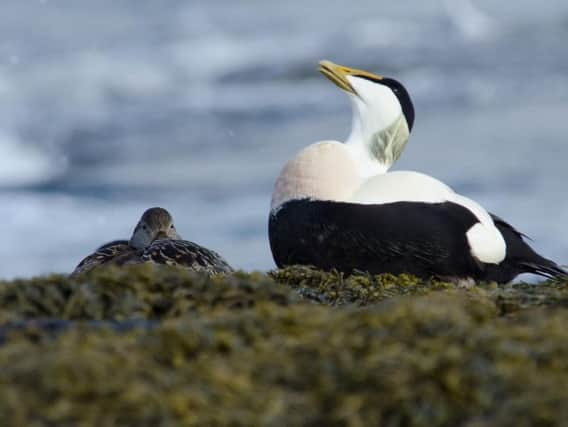Help save Northumberland's sea duck


Also known as Cuddy’s duck – after St Cuthbert – it is believed eiders inspired the saint to create the world’s first conservation legislation in the eighth century, apparently decreeing that no one should eat or disturb those nesting on the Northumberland coast.
More than a millennium later, eiders remain a cause for conservation concern. They are declining throughout Europe as a result of hunting, pollution and disturbance.
Advertisement
Hide AdAdvertisement
Hide AdEarly this year, the Government designated the stretch of sea between Whitley Bay and Alnwick in Northumberland as the Coquet to St Mary’s Marine Conservation Zone (MCZ), which will form part of a network of protected areas around England’s seas. However, as it currently stands, the nationally important population of eiders that live within this zone all year round will not be covered by the new legislation.
Now the RSPB is calling on Thérèse Coffey, Minister for Environment, to add eiders as a feature to the MCZ, which means that protection and management for birds can be put into place. They need people to show they care about the future of this integral part of Northumberland culture by writing to their MP and getting them to tell the Minister why this bird needs to be protected.
Anna Cucknell, RSPB marine conservation officer for North East England, said: “Although the Government has committed to protecting some of the habitats off the Northumberland coast, the Marine Conservation Zone won’t provide any direct protection for eider ducks or any of the other seabirds that live here. Our resident eider populations have continued to decline steadily over the last few decades, and so protection in their sea-based feeding and wintering habitats is essential.
“We still have a final chance to try to get eiders the protection they need to help stop their numbers plummeting further. If we don’t protect our resident Northumberland eider, no one else can.”
Advertisement
Hide AdAdvertisement
Hide AdYou can find your MP and the various ways to contact them via the Write to Them website. Or all MPs can be reached by writing to them at House of Commons, London SW1A 0AA.
The UK’s heaviest duck, eiders are surprisingly quick and can clock speeds of up to 50mph.
Watch the attached video featuring Anna Cucknell talking about the importance of eiders in Northumberland.